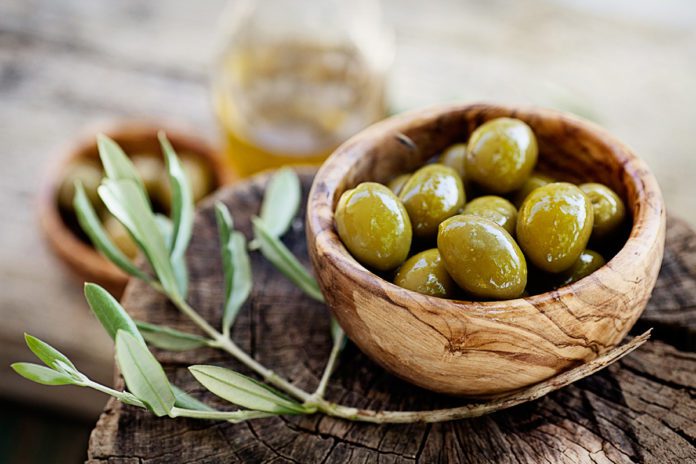When it comes to the most popular diets for health-conscious individuals, the Mediterranean diet is known to be one of the best for a variety of different reasons. This is a diet that is made up of a unique selection of fresh, plant-based foods that truly help to improve your overall health and well-being.
However, aside from its food choices and health benefits, perhaps the biggest reason the Mediterranean diet has gained such traction in recent years is because it is also incredibly flexible and doesn’t force you to give up foods that you truly enjoy having. As a result, this diet truly helps keep you and your body nourished with a high-quality, balanced diet that never leaves you feeling like you’re missing out on all of your favorite foods. But what truly does the Mediterranean diet consist of? And what non-diet foods are you allowed to have on it sometimes?
To help give you a better idea of what you can and cannot eat on the Mediterranean diet, today, we’re going to go over an in-depth guide to the essential food groups you can eat on this diet as well as some that you can eat sparingly to help you keep as healthy and as happy as possible. Let’s get started.
What is the Mediterranean diet?
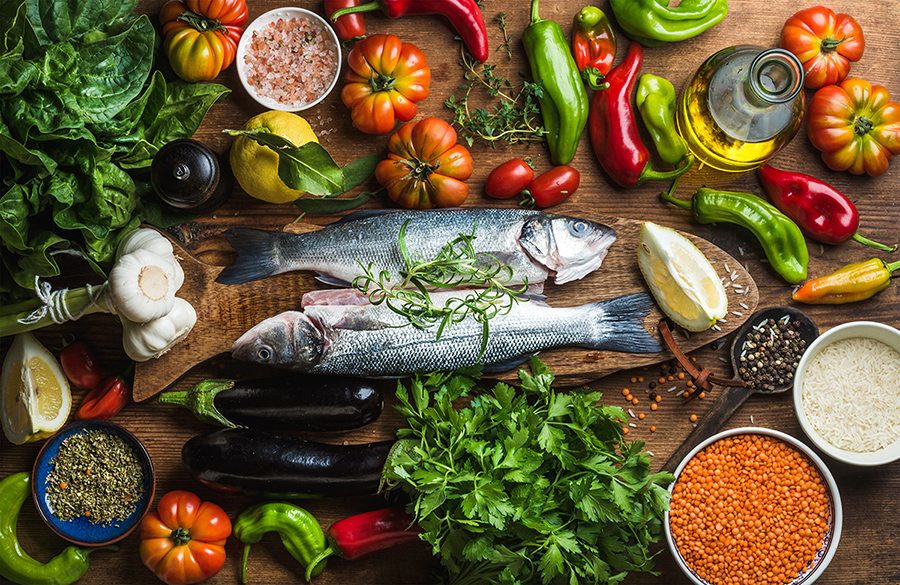
To start, the Mediterranean diet is a unique nutritional diet based around the traditional plant foods from the countries surrounding the Mediterranean region, such as Italy, France, Greece, and Spain. This diet typically includes whole foods and fresh produce from the region, such as fresh vegetables, legumes, whole grains, nuts, and fresh fruit. As a result of its natural and sustainable ingredients, this diet is known to be incredibly healthy for your mind and your body and can contribute to a healthier state of being overall.
Not to mention, numerous studies have also been done on the Mediterranean diet that has shown that not only can following this diet help to promote weight loss, but it may also be able to reduce your chances of heart disease, stroke, type 2 diabetes, and other diseases (everydayhealth.com). For this reason, this diet has been ranked as the best diet of all for the fourth year in a row by the U.S. Health News and World Reports and is truly unlike any other.
What Foods to Eat?
Next, now that we’ve gone over a little bit about what the Mediterranean diet is, we wanted to dive into the specifics of what foods make up this diet to begin with. With that said, here is the list of the top categories of food that you would normally consume on the Mediterranean diet.
1. Vegetables

To start, the first food that is mostly consumed on the Mediterranean diet is vegetables. Vegetables are typically the number one food to consume when you’re on a diet, to begin with, but on the Mediterranean diet, they truly make up the core of what this diet consists of. This is because vegetables are rich in key nutrients that keep your body and your brain thriving. And the best part is that nearly all vegetables can be enjoyed on the Mediterranean diet, including starchy ones, such as potatoes. With that said, while on the Mediterranean diet, you might wanna reach for vegetables such as:
- Tomatoes
- Artichokes
- Broccoli
- Zucchini
- Green beans
- Sweet potatoes
- Kale
- Arugula
- Spinach
- Cauliflower
- Carrots
- Brussel sprouts
- Cucumbers
- Bell peppers
- Turnips
- Fresh herbs
And more. However, as we mentioned above, there truly isn’t a ‘bad’ vegetable to eat on the Mediterranean diet, so you are free to eat whichever suits your preference.
For more information on other vegetables that you may want to include in your diet, as well as some tips and tricks on cooking with them, be sure to check out livehealthy.chron.com for more information.
2. Fresh fruit
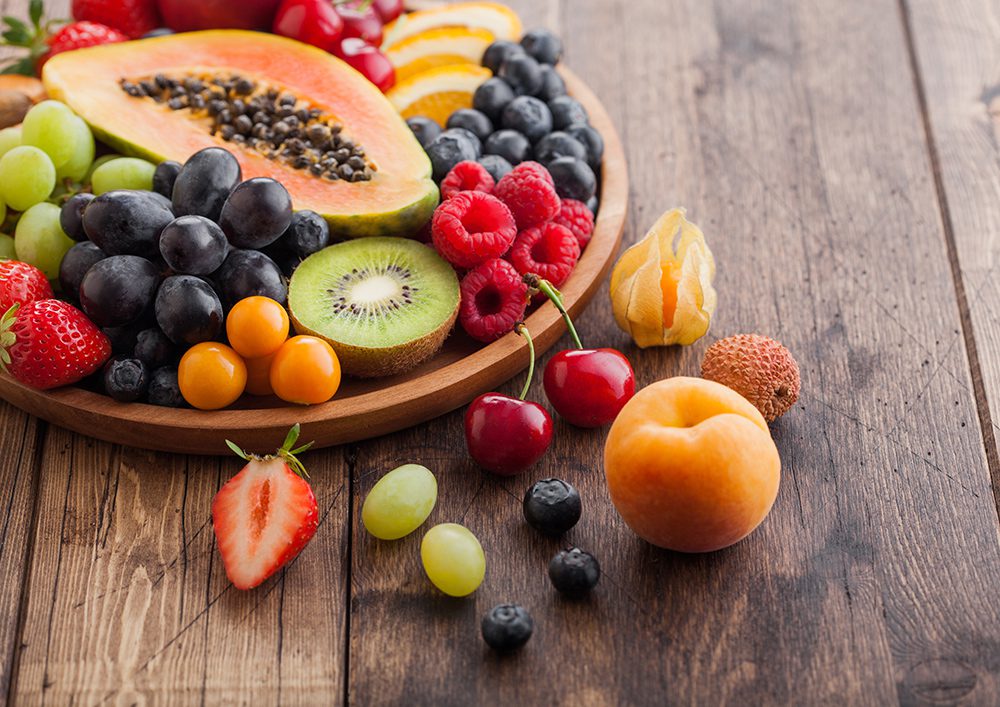
Next on the list is fruit. Fruits are, in fact, another key ingredient of the Mediterranean diet’s plant-based focus and are packed with essential vitamins, antioxidants, and other nutrients that can help to contribute to a healthier state of being overall. With that said, some of the best fruits you may want to look for include:
- Apples
- Bananas
- Pears
- Oranges
- Grapes
- Figs
- Peaches
- Melons
And more. However, truly no fruit is off-limits, as they are considered to be an essential ingredient for the Mediterranean diet. And of course, talking with a doctor about your sugar intact and your dietary needs in regards to fruit is the best option to determine what you may need in terms of your daily value prior to consuming.
3. Nuts

Next, another key ingredient that is a regular for the Mediterranean diet is nuts and seeds. With that said, not only do nuts and seeds contain heart-healthy fats as well as essential vitamins and minerals, but they are also rich in protein that helps to keep you feeling full for hours at a time, helping you to consume less and shed pounds more easily. With that said, a few options in terms of nuts and seeds you may want to consume include:
- Almonds
- Walnuts
- Hazelnuts
- Macadamia nuts
- Cashews
- Pumpkin seeds
- Sunflower seeds
And more. The best part is that nuts and seeds can be easily enjoyed on their own or added to a variety of dishes, including yogurt or salad. However, just be sure to choose raw and unsalted nuts and seeds whenever you can to help keep them as healthy as possible.
4. Legumes
 Next up, legumes are another common ingredient for the Mediterranean diet and are a great
source of protein, potassium, iron, and other essential nutrients. On top of that, legumes are also slow-digesting,
helping to keep you feeling full for longer periods of time, which can help you to better control your weight. With
that said, some examples of legumes to consume on the Mediterranean diet include:
Next up, legumes are another common ingredient for the Mediterranean diet and are a great
source of protein, potassium, iron, and other essential nutrients. On top of that, legumes are also slow-digesting,
helping to keep you feeling full for longer periods of time, which can help you to better control your weight. With
that said, some examples of legumes to consume on the Mediterranean diet include:
- Beans
- Peas
- Lentils
- Chickpeas
- Pulses
- Peanuts
And more. Not to mention, since legumes are so versatile, they are great to use in a variety of unique recipes, such as soups, salads, or hummus. Truly, the sky is your limit when it comes to cooking with legumes, which is why it is one of the best ingredients to have at your side on the Mediterranean diet.
5. Wholegrains
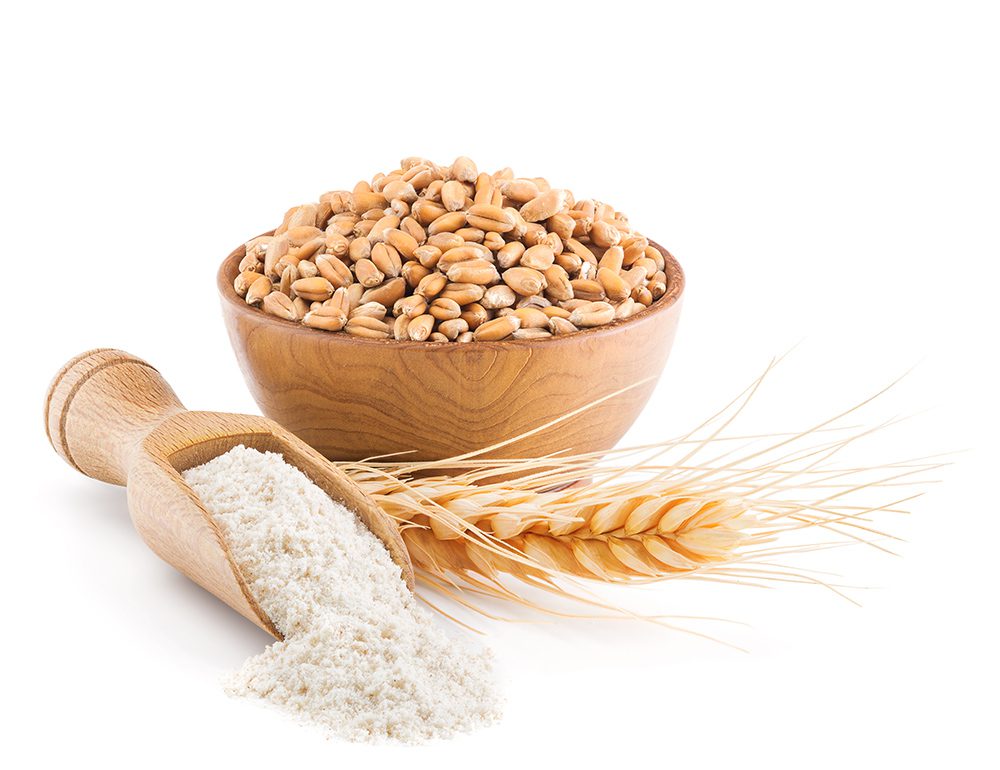
Next up, unlike many diets that completely eliminate carbs, whole grains are another key ingredient of the Mediterranean diet that provides you with healthy fat and a variety of other essentials for your diet. And the best part is, they come in a variety of different forms that can be consumed in a number of unique ways. With that said, a few whole grains to keep an eye out for while on this diet typically include:
- Quinoa
- Wholegrain bread/pita bread
- Whole grain pasta
- Oats
- Barley
- Brown rice
And more. The most important thing to remember is that whole grains are great for your health while processed and refined grains are not. This means highly processed or bleached grains, such as white bread or pasta, should be avoided as much as possible.
6. Meat
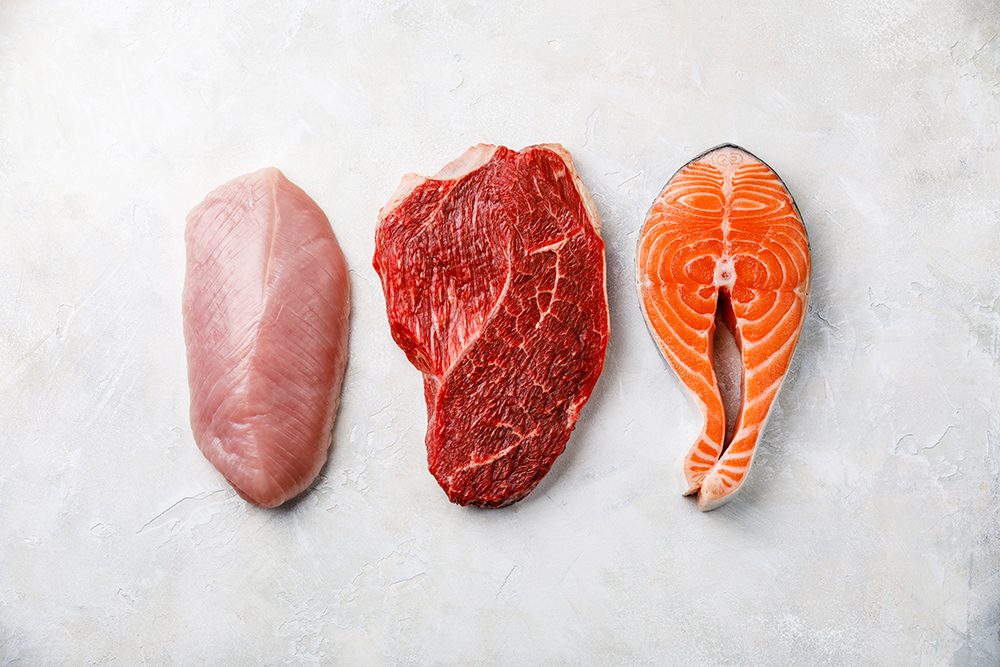
Up next, while the Mediterranean diet puts a large focus on fish and plant-based proteins, poultry meat is still an excellent option to consume on this diet in moderation. With that said, if you eat meat, some options for meat in line with the Mediterranean diet’s nutritional values includes:
- Chicken
- Turkey
- Eggs
And more. More than anything, skinless white meat is what you typically want to aim for in terms of meat on the Mediterranean diet, and you should therefore eat lean beef, lean pork, lamb, and other red meat in limited quantities to keep in line with the diet.
8. Fats/oils
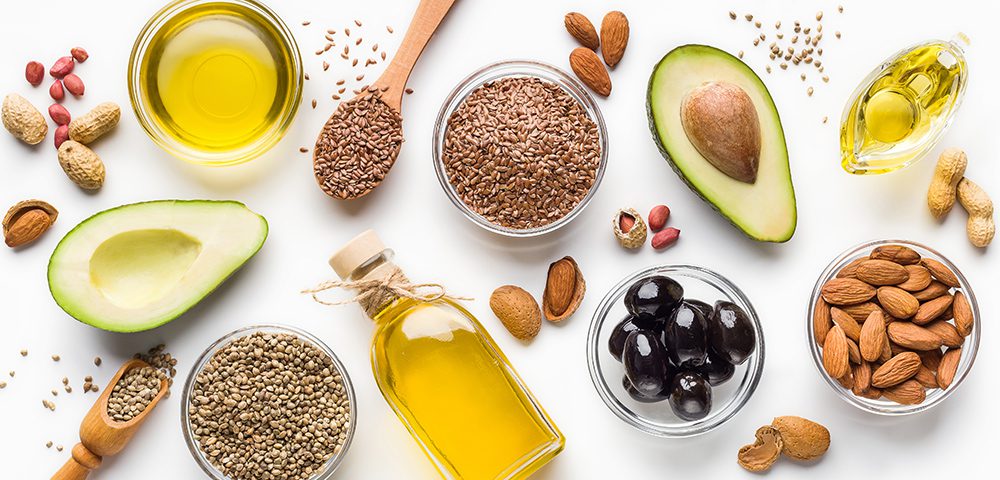
Next, due to the cultural influence of the countries that this diet is based on, one of the biggest staple ingredients of the Mediterranean diet is extra virgin olive oil. In fact, olive oil has been shown in multiple studies to have numerous health benefits contributing to heart and blood health and is a well-known superfood ingredient, thanks to its high levels of monounsaturated fat and other essential nutrients.
However, aside from olive oil, there are a variety of other plant-based oils that are also great choices to add to your diet plan to enhance your sources of fats and essential minerals. This includes oils such as:
- Avocado oil
- Flaxseed oil
- Fish oil
- Grapeseed oil
- Sesame oil
And more. These oils are also extremely versatile and can be included for additional flavor in various meals, such as in sauteed vegetables, pasta dressings, hummus, or even as a salad dressing.
However, with that said, oils from animal fats, butter, and refined, processed, and hydrogenated oils should also be avoided as much as possible while on the Mediterranean diet, as these are all considered to be extremely unhealthy for your body. You can read more about the best and worst oils to consume on the Mediterranean diet here on drgourmet.com.
9. Dairy

Next on the list is dairy products. While dairy is one of the most common ingredients of the Mediterranean diet, it should be eaten sparingly along this low-fat diet, as it can also be very high in calories and fats. Therefore, dairy ingredients you can eat on this diet typically include:
- Low-fat cheese such as goat cheese or parmesan
- Low-fat or fat-free milk
- Low-fat Greek yogurt
With that said, processed dairy ingredients, such as American cheese, high sugar yogurts, whole milk, and creams, should be avoided as much as possible, as these are considered too fatty and sugary to match the nutritional needs of the diet.
10. Seafood
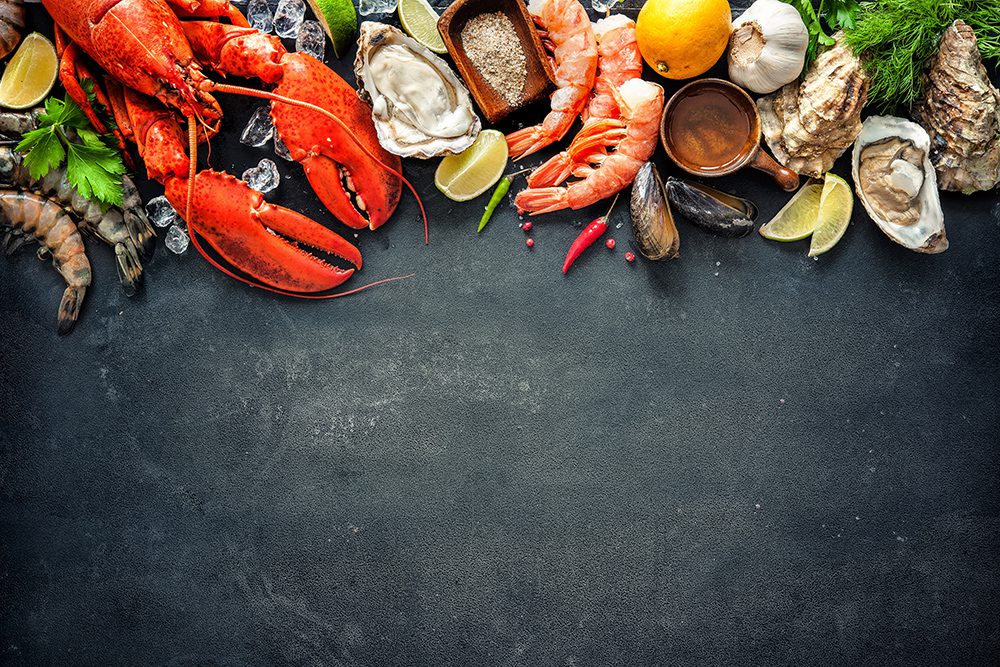
And lastly, another ingredient commonly used in the Mediterranean diet is seafood. This food selection follows a true Mediterranean-style diet and is largely based around the aquatic life in the Mediterranean sea. Therefore, if you eat fish, you may want to keep an eye out for seafood such as:
- Sardines
- Salmon
- Trout
- Mackerel
- Oysters
- Crabs
- Clams
- Shrimp
- Mussels
And more. Not to mention, aside from the benefits associated with the Mediterranean diet, eating fish regularly is also believed to be able to lower your risk of heart disease and is a great food that can be used in a variety of different Mediterranean diet recipes.
For more on the benefits of consuming fish on the Mediterranean diet, be sure to check out the article here on mayoclinic.org for more information.
What foods to limit
Next, now that we’ve gone over some of the key ingredients of the Mediterranean diet you’ll want to include in your diet, we also wanted to share a list of some of the main foods you’ll want to limit and avoid as much as possible while on your diet. With that said, here’s our list of the top 5 things to limit while on the Mediterranean diet.
1. Sugar
To start, the first ingredient you’ll want to limit with any diet is sugar. This includes foods such as candy, soda, syrup, and baked goods. This is because sugar is a highly processed ingredient that is very easy to overconsume in our daily lives, which can make us gain weight very quickly. For that reason, sugar should only be consumed in very small quantities sparingly, especially while following the fresh and earthy Mediterranean diet.
2. Refined grains
Next, as we mentioned above, while following the Mediterranean diet, you’ll definitely want to cut back on refined grains such as white bread, pasta, chips, tortillas, and crackers. This is because refined grains are known to be very high in carbs and calories that are easily digested, which means they won’t leave you feeling full for very long. Because of this, consuming refined grains can lead you to easily overeat and could also contribute to obesity and other metabolic diseases. Therefore, these ingredients should be limited while on the Mediterranean diet.
3. Trans fats
Next, trans fats are a big ingredient to limit as much as possible in your daily life as is, but especially while on the Mediterranean diet. This is because trans fats are known to raise your bad cholesterol levels and can greatly contribute to heart disease (mayoclinic.org). Therefore, it’s best to avoid margarine, non-dairy creamer, fried foods, and other processed foods like this to keep better health and help you stick to your diet as much as possible.
4. Processed meat
Next, while on the Mediterranean diet, you’ll also want to avoid processed meats as much as possible as well. This is because processed meats, when consumed in large quantities, are believed to increase your risk of cancer and cardiovascular disease. Therefore, be sure to avoid meat such as sausages, bacon, hot dogs, jerky, and deli meats as much as possible.
5. Highly processed foods
And lastly, just as with any diet, you’ll want to keep your diet as clean as possible and avoid any highly processed foods, such as fast food, microwavable snack foods, granola bars, dried fruits, cereals, fried foods, white bread, and more. Highly processed foods are unfortunately full of a lot of preservatives and very few nutritional benefits and should therefore be limited in your diet as much as possible.
Beverages
Next, we wanted to include a quick section covering some of the beverages to consume and to avoid while on the Mediterranean diet. Of course, water should be your #1 go-to beverage on a Mediterranean diet and most other diets; however, you can also enjoy yourself with several other beverages on this diet, including:
- Red wine
- Natural fruit juice
- Coffee
- Tea
To go along with this, you’ll want to also limit sugar-sweetened beverages, such as soda or sweet tea, as much as possible to help keep in line with the principles of the Mediterranean diet.
However, with that said, certain foods and beverages, such as red wine, should not be consumed while on certain medications. For this reason, all dietary changes should be discussed thoroughly with your doctor prior to consumption to give you the best chance at achieving success with your health and overall well-being.
Conclusion
In conclusion, the Mediterranean Diet is easily one of the best plant-based diets around. With its unbeatable flexibility in regards to its food and drink selections to its proven benefits for your brain and heart, the Mediterranean diet is one of the most beneficial diets for your mind and body and is definitely worth looking into if you’re looking to achieve your best health possible.
Above all else, we hope this article has helped you to better understand the Mediterranean diet, which foods are best to eat and avoid for it, and why it may be one of the best choices in diets for improving your health and well-being the true Mediterranean way.
Sources:
https://www.healthline.com/nutrition/mediterranean-diet-meal-plan
https://www.everydayhealth.com/mediterranean-diet/guide/
https://www.heart.org/en/healthy-living/healthy-eating/eat-smart/nutrition-basics/mediterranean-diet


